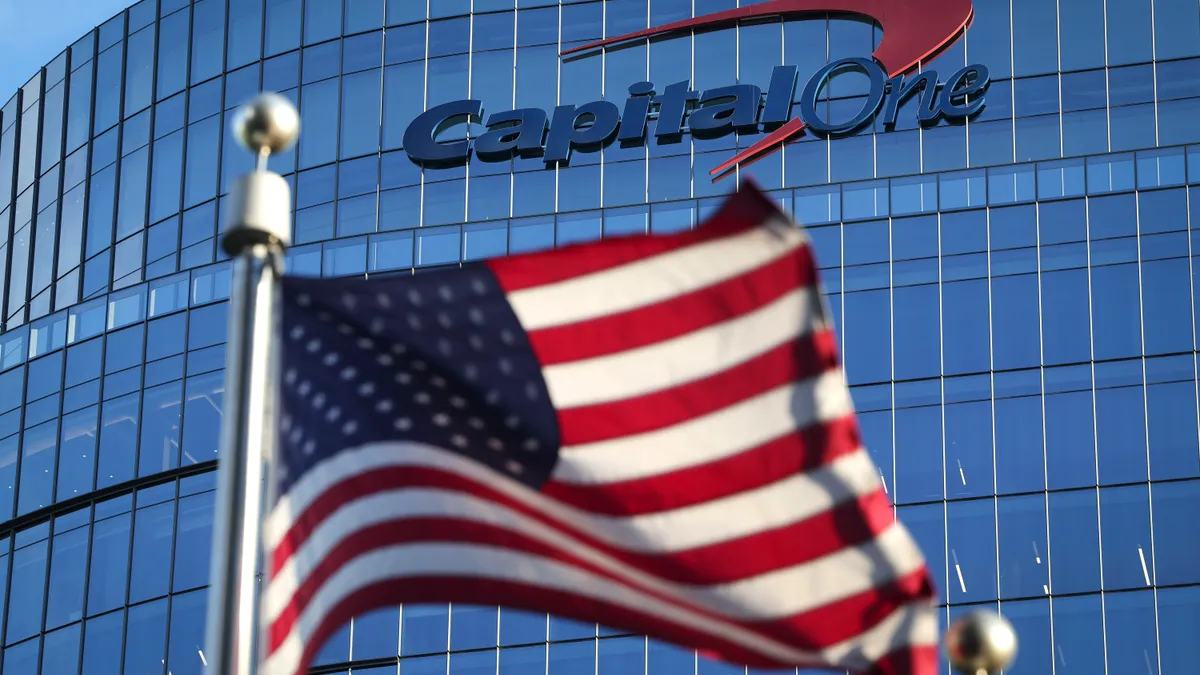Capital One has agreed to buy Discover in a $35.3 billion all-stock deal, the companies announced late Monday.
The transaction, estimated to close late this year or early next year, could stabilize Discover after a tumultuous 2023. The deal also marks a major advance for a bank well-known for its credit card component.
Acquiring Discover would give Capital One access to 305 million additional cardholders — roughly quadrupling its base in that space, according to The New York Times.
The companies would combine to cover a 19% share of the $1.3 trillion revolving consumer loan market, Brian Foran, an analyst at Autonomous Research, told American Banker. That would put Capital One ahead of both Citi and JPMorgan Chase, the latter of which currently leads the market with 16%.
In Discover, Capital One would acquire the nation’s fourth-largest card network, accepted by merchants at 70 million access points. In theory, the combination would reduce Capital One’s reliance on Discover competitors Visa and Mastercard, with whom the bank partners to issue cards. Both companies recently renewed their partnerships with Capital One, though, JPMorgan analyst Tien-tsin Huang told Reuters, so any transition will take time.
Capital One CEO Richard Fairbank, in a statement Monday, called the deal a “singular opportunity.”
"From Capital One's founding days, we set out to build a payments and banking company powered by modern technology," Fairbank said. “Through this combination, we're creating a company that is exceptionally well-positioned to create significant value for consumers, small businesses, merchants and shareholders as technology continues to transform the payments and banking marketplace.”
The deal could give each company a foothold in areas where they don’t typically focus. Capital One, historically, has found its niche with consumers who carry a balance each month. But the bank has tried, through partnerships such as its acquisition last year of digital concierge service Velocity Black, to advance on the premium market. Discover has largely eschewed gimmicks and perks to make its mark among prime customers.
Capital One plans to maintain the Discover brand on its cards and network even after the deal closes, The Wall Street Journal reported.
The combination may also lend Discover an element of regulatory gravitas amid struggles it has weathered since July, when the card network disclosed both a merchant acquiring pricing error and a probe by the Federal Deposit Insurance Corp. into compliance management.
The regulator issued a consent order in September, addressing violations of four consumer protection laws. But ahead of that, Discover’s CEO, Roger Hochschild, abruptly resigned. Discover would hire TD veteran Michael Rhodes to serve as its next chief executive, but rumors swelled that the card network was ripe for acquisition.
"The transaction with Capital One brings together two strong brands with enhanced ability to accelerate growth and maximizes value for our shareholders, enabling them to participate in the tremendous upside of the combined company," Rhodes said Monday. "This agreement underscores the strength of our business and is a testament to the hard work of Discover employees. We look forward to a bright future as part of the Capital One family and to providing expanded opportunities for our loyal customers.”
During an investor call Tuesday, Rhodes said he anticipates assuming an advisory role, reporting to Fairbank, for a year after the deal closes.
The deal comes at a time of heightened scrutiny of banking mergers from Biden administration regulators — a notion one consumer advocate referenced in opposing the deal.
“It is very difficult to imagine how federal regulators could allow Capital One to buy Discover given the requirement that mergers benefit the public as well as insiders,” Jesse Van Tol, CEO of the National Community Reinvestment Coalition, said in a statement.
TD and First Horizon, for example, terminated their planned $13.4 billion tie-up last May, when it became unclear, after more than 14 months, whether the deal would gain regulatory approval. By comparison, the Capital One deal is nearly triple the dollar amount — at least the largest merger in banking since BB&T and SunTrust combined in 2019 to form Truist.
Under the deal’s terms, Discover shareholders would receive 1.0192 Capital One shares for each of their shares in the card network — a 26.6% premium based on Discover's $110.49 closing price from Friday, the companies said. Once the deal closes, Capital One shareholders would own roughly 60% of the combined company, and Discover shareholders would own about 40%. Three Discover board members would join Capital One’s board.
The transaction stands to generate $2.7 billion in cost savings by 2027, the companies said, breaking that figure down to $1.5 billion in “expense synergies” and $1.2 billion in “network synergies.” Capital One and Discover expect the deal to be 15% accretive within three years and give the combined company a common equity tier 1 ratio of roughly 14% at closing.
If the deal comes at what seems a down time for Discover — the card network saw its profits plunge 62% in 2023’s fourth quarter — the same could be said of Capital One, which lost 43% in the same time period, compared with a year earlier.
One outstanding question will be whether “regulators view this as a white knight coming in to help fix a troubled player in the market or whether they view this as a limitation of competition — and therefore something to avoid,” David Schiff, a senior partner at digital services consultant West Monroe, told The New York Times.























